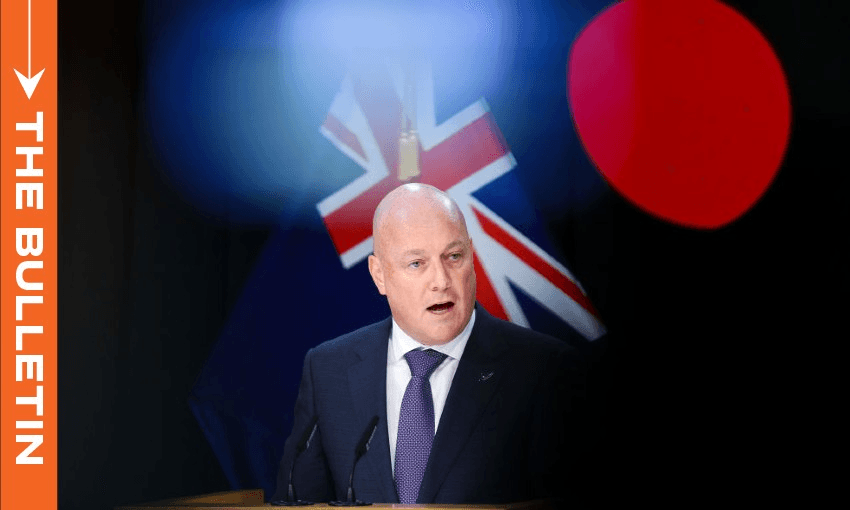The prime minister demanded local government ‘rein in the fantasies’ and ditch the ‘white elephants’, explains Stewart Sowman-Lund in today’s extract from The Bulletin.
To receive The Bulletin in full each weekday, sign up here.
Groans and applause
Christopher Luxon has delivered a stern message to local councils: tighten your belts and get back to delivering the basics. The prime minister received a somewhat frosty reception at the Local Government New Zealand conference in Wellington yesterday, reported Stuff’s Glenn McConnell, with “groans, but also a smattering of applause” as he took aim at council spending. His biggest target was the council of the region he was speaking in – Wellington – including criticising the venue that the conference was being hosted in. “With pipes bursting and other infrastructure under pressure, Wellington City Council decided to spend $180 million of ratepayers’ money on a convention centre, which, according to public reporting, is now losing money,” the prime minister said.
Ditch the ‘white elephants’
As the Herald’s Georgina Campbell pointed out, the Tākina Convention Centre was actually developed at a time when Wellington’s struggling infrastructure wasn’t in the limelight. Nevertheless, the prime minister had a perfect visual aid to accompany his imagery of creaking infrastructure: a burst water main had flooded a nearby road earlier in the day. Luxon didn’t hold back during his address, urging councils to “rein in the fantasies” and ditch the “white elephants”. Several attendees at the conference publicly condemned the PM’s speech, Campbell reported, including Wellington mayor Tory Whanau who said Luxon had “punched down”. On Twitter, Green Party regional councillor Thomas Nash called Luxon’s address “one of the most mana diminishing, paternalistic and visionless speeches to a group of people I have ever heard”.
Luxon didn’t just come with strong words. There was also proposal, reported the Herald’s Thomas Coughlan, that would restrict the ability of councils to hike rates to pay for non-core spending. Local government minister Simeon Brown said the proposal, which may involve a regulator, had worked in New South Wales. But there’s little detail about what would be considered non-core spending, noted The Post’s Thomas Manch, speculating it could mean cycle ways or just “anything the government deems unworthy”.
The localism debate
All of this sounds a little bit like the government butting into local politics, something which National in opposition was highly critical of. Luxon, speaking to media after his speech, pushed back on that, reported The Post’s Thomas Manch. Councils have a responsibility not to do “dumb stuff”, said the prime minister. “We are big fans of localism and devolution, but with that doesn’t mean we just send cash to the local communities and we get nothing for it in return. We expect a return on that investment.” But as The Spinoff’s Joel MacManus argued earlier this year, since entering government, National has quickly developed a shaky track record when it comes to embracing localism. Ditching Auckland’s regional fuel tax is one such example, with mayor Wayne Brown effectively demanding central government stop interfering in the city he’s in charge of. “This is my city, not theirs,” Brown said. As we discussed earlier in the year, the government also scrapped proposed reforms for the future of local government. On Twitter, Labour’s Kieran McAnulty called Luxon’s latest remarks “cynical”.
Moving forward, the government has shown support for securing cross-party consensus on “city deals” – which, as MacManus explained, “typically involve a long term contract between central government and councils, empowering councils to take on major infrastructure or other projects in exchange for a greater share of the tax take”.
Support for Māori wards
Wellington’s mayor Tory Whanau also took aim at the government for getting involved in the workings of local government when addressing the issue of Māori wards. Under a new law put forward by the government, councils will be required to hold a public referendum at the next local election if they wish to keep or bring in a Māori ward. The Spinoff’s Shanti Mathias explained the intricacies of that proposal earlier in the year. As Waatea News reported, there were protests outside the venue yesterday in support of Māori wards, while inside, council leaders themselves voiced support for having choice. “Councils should decide for themselves on the use of Māori wards,” Whanau said yesterday. Local Democracy’s Susan Botting reported that more than 80% of councils at the meeting endorsed a push against the government’s new legislation led by the Palmerston North council.

